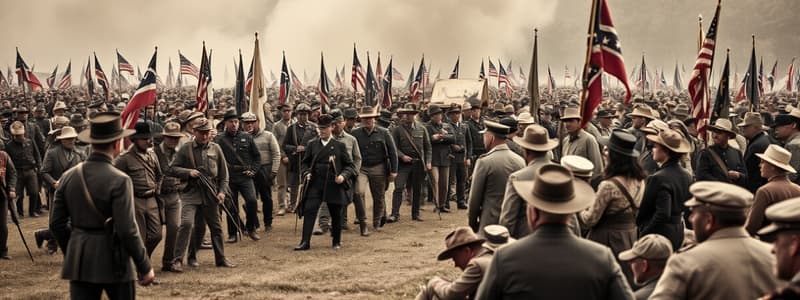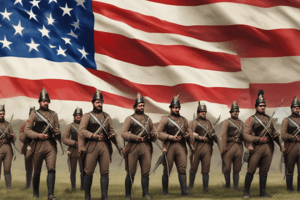Podcast
Questions and Answers
From the perspective of the Confederacy, what was the war about?
From the perspective of the Confederacy, what was the war about?
The war was about slavery; more specifically, it was about maintaining the present way of life including the social structure and economy.
What was the situation that black people were in after the Civil War?
What was the situation that black people were in after the Civil War?
Discrimination was still rampant, they were not immediately given the right to vote, and many, including Lincoln himself, opposed equality.
How did Johnson 'lay the groundwork for mass murder'?
How did Johnson 'lay the groundwork for mass murder'?
He pardoned many Confederate leaders, allowing them to regain control and implement severe anti-black violence without response.
How did the Black Codes and the prison system create a new form of slavery?
How did the Black Codes and the prison system create a new form of slavery?
What is ironic about Johnson's opposition to leasing land to freedmen?
What is ironic about Johnson's opposition to leasing land to freedmen?
What is ironic about Johnson's statement that black people are lazy and don't want to work?
What is ironic about Johnson's statement that black people are lazy and don't want to work?
What is ironic about the claim that the Black Codes prevented blacks from being a burden to the state?
What is ironic about the claim that the Black Codes prevented blacks from being a burden to the state?
What is ironic about Johnson's view that African Americans needed to earn their citizenship?
What is ironic about Johnson's view that African Americans needed to earn their citizenship?
What were Johnson's objections to the Freedmen's Bureau Bill and the Civil Rights Act of 1866?
What were Johnson's objections to the Freedmen's Bureau Bill and the Civil Rights Act of 1866?
Why could market forces of supply and demand not enable black people to improve their conditions without help from the federal government?
Why could market forces of supply and demand not enable black people to improve their conditions without help from the federal government?
How were black people prevented from voting?
How were black people prevented from voting?
What rights did the Supreme Court undermine?
What rights did the Supreme Court undermine?
Who did the Supreme Court identify as being the ultimate defender of rights?
Who did the Supreme Court identify as being the ultimate defender of rights?
Why did black people want to leave the South?
Why did black people want to leave the South?
How did the sharecropping system work?
How did the sharecropping system work?
How did white people react to a black person 'getting ahead' or trying to leave?
How did white people react to a black person 'getting ahead' or trying to leave?
What problems did black people encounter above the Mason-Dixon line?
What problems did black people encounter above the Mason-Dixon line?
In what sense were black people seen as not having a right to their rights?
In what sense were black people seen as not having a right to their rights?
What was the explicit goal of Senator Eastland and others?
What was the explicit goal of Senator Eastland and others?
What was the problem with 'separate but equal' schools?
What was the problem with 'separate but equal' schools?
How did states respond to the Supreme Court's Brown decision to desegregate schools?
How did states respond to the Supreme Court's Brown decision to desegregate schools?
How did states prevent black people from voting?
How did states prevent black people from voting?
Why are schools that serve predominantly white students better funded than schools serving predominantly minority students?
Why are schools that serve predominantly white students better funded than schools serving predominantly minority students?
In the 1973 case of San Antonio Independent School District v. Rodriguez, what argument did Texas give for saying funding disparities were not discriminatory?
In the 1973 case of San Antonio Independent School District v. Rodriguez, what argument did Texas give for saying funding disparities were not discriminatory?
In the 1973 case of San Antonio Independent School District v. Rodriguez, what arguments do Anderson and Justice Thurgood Marshall give for saying the funding disparities were discriminatory?
In the 1973 case of San Antonio Independent School District v. Rodriguez, what arguments do Anderson and Justice Thurgood Marshall give for saying the funding disparities were discriminatory?
In the 1974 case of Milliken v. Bradley, what reasons do Anderson and Justice Thurgood Marshall give for disagreeing that school segregation was nobody's fault?
In the 1974 case of Milliken v. Bradley, what reasons do Anderson and Justice Thurgood Marshall give for disagreeing that school segregation was nobody's fault?
How did the Nixon and Reagan administrations portray the reason for the Civil Rights movement?
How did the Nixon and Reagan administrations portray the reason for the Civil Rights movement?
How did the Nixon and Reagan administrations portray racism?
How did the Nixon and Reagan administrations portray racism?
How did the Nixon and Reagan administrations portray the opportunities that society now offered to black Americans?
How did the Nixon and Reagan administrations portray the opportunities that society now offered to black Americans?
What widespread feeling among white Americans towards black Americans did Nixon and Reagan tap into?
What widespread feeling among white Americans towards black Americans did Nixon and Reagan tap into?
How and why did Nixon make his racism more covert and less explicit?
How and why did Nixon make his racism more covert and less explicit?
How did Reagan publicly portray his attitudes about race?
How did Reagan publicly portray his attitudes about race?
In what sort of programs did Reagan advocate budget cuts?
In what sort of programs did Reagan advocate budget cuts?
What effect did budget cuts have on black college enrollment and unemployment gap?
What effect did budget cuts have on black college enrollment and unemployment gap?
Who manufactured and facilitated the drug crisis, how, and for what reason?
Who manufactured and facilitated the drug crisis, how, and for what reason?
How did Reagan advocate for handling drug abuse?
How did Reagan advocate for handling drug abuse?
What does Anderson mean in saying that the media 'blackened crack'?
What does Anderson mean in saying that the media 'blackened crack'?
What are the key features of the anti-drug abuse act?
What are the key features of the anti-drug abuse act?
Why does Anderson say that racial discrimination was legalized in the criminal justice system?
Why does Anderson say that racial discrimination was legalized in the criminal justice system?
What methods have been used to try and suppress black and Latino voting?
What methods have been used to try and suppress black and Latino voting?
How did John McCain's strategists portray Obama?
How did John McCain's strategists portray Obama?
What did Mitt Romney say he wished Obama would learn?
What did Mitt Romney say he wished Obama would learn?
In what way do some people seem to exhibit 'historical amnesia'?
In what way do some people seem to exhibit 'historical amnesia'?
Flashcards are hidden until you start studying
Study Notes
Civil War and Reconstruction
- Confederacy's perspective: The war centered on preserving slavery and the Southern way of life, including its social and economic systems.
- Post-Civil War: Black people faced rampant discrimination, lacked voting rights, and had no political power or protection against white supremacy.
Johnson's Policies and Their Impact
- Andrew Johnson granted amnesty to many Confederate leaders, reinstating their control and contributing to severe anti-Black violence without federal intervention.
- Johnson's endorsement of the Black Codes resulted in new forms of oppression; for example, labor auctions were established for Black workers who defied contracts.
- His opposition to leasing land to freedmen while supplying land to poor white men illustrated blatant racism.
Racial Stereotyping and Citizenship
- Johnson described Black people as lazy, contradicting the fact that they were the ones doing the labor while white landowners often did not work.
- The Black Codes depicted Black people as a burden to the state, although they made self-sufficiency impossible.
- Johnson erroneously argued that African Americans needed to earn citizenship despite their contribution to the nation's wealth over centuries.
Legislative Obstructions
- Johnson contested the Freedmen's Bureau Bill and the Civil Rights Act of 1866, claiming they were unconstitutional and unnecessary, anticipating potential Black dependence on government.
- Efforts to prevent Black individuals from voting included poll taxes and attempts to defer ratification of the 14th Amendment.
Supreme Court Decisions
- Landmark cases like Minor v. Happersett reinforced that voting rights are enforced by states, while United States v. Cruikshank reduced federal protections against racial violence.
- Rulings in the Civil Rights Cases (1883) permitted public discrimination, undermining rights to dignity and equality.
Black Migration and Economic Exploitation
- Many Black people sought to leave the South due to unsafe environments marked by violence and systemic oppression.
- Sharecropping entrenched economic hardship, with landowners exploiting Black laborers through debts and contracts.
Resistance to Black Advancement
- White Southerners opposed Black progress through various means, including enticement laws and violence against Black individuals seeking to leave.
- Discrimination continued beyond the Mason-Dixon line, with Northern cities fighting against discrimination and facing issues like scarce housing and racial tensions.
Education and Economic Inequality
- "Separate but equal" schooling resulted in significant resource disparities; Black schools suffered from funding shortages and inadequate resources.
- School funding primarily based on property taxes created inequalities, as minority neighborhoods often held lower property values.
Impact of Federal Policies
- Supreme Court decisions, like San Antonio Independent School District v. Rodriguez, did not address the discriminatory funding disparities, hindering the education of Black children.
- Budget cuts initiated during the Nixon and Reagan administrations disproportionately affected programs benefiting Black Americans, exacerbating economic gaps.
Drug Policy and Criminalization
- The Reagan administration was implicated in fostering the drug crisis, which had a devastating effect on Black communities, framing drug abuse as a criminal issue requiring incarceration.
- Discriminatory policies in the criminal justice system legitimized racial profiling and targeted laws against Black citizens.
Voter Suppression Tactics
- Modern methods of voter suppression included stringent ID requirements, limiting access to voting resources, and manipulating voting districts.
- Racially motivated tactics aimed specifically at disenfranchising Black and Latino voters through historical legislation such as poll taxes and literacy tests.
Post-Racial Narratives
- Nixon and Reagan redefined racism narrowly and suggested that societal issues arose from individual failings rather than systemic problems, promoting a "colorblind" perspective.
- The portrayal of opportunities available to Black Americans suggested that all barriers had been removed, failing to address ongoing inequities.
Media Representation
- The media's depiction of the drug epidemic predominantly associated Black individuals with crime, impacting public perception and policy responses.
- The Ant-Drug Abuse Act emphasized punitive measures over treatment, leading to long-term negative consequences for Black communities.
Racial Awareness and Historical Amnesia
- Many Americans exhibited "historical amnesia," forgetting government roles in societal advancement and attributing gains solely to personal effort, particularly when issues of race were involved.
Studying That Suits You
Use AI to generate personalized quizzes and flashcards to suit your learning preferences.




